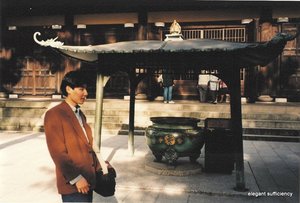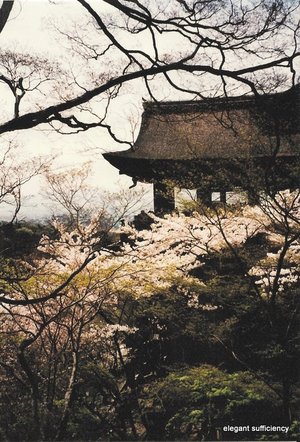Why Japan?
Since we returned from our weekend in Tokyo, several people have asked what took us to Japan and why we are so passionate about the country.
The answer is below.

We first went to Kyoto in 1994, as part of a fairly non-standard round-the-world trip. Edward was nine and we had discovered that we could have a great adventure for the price of an economy air ticket and a few pretty unmemorable hotels. In the previous two years we'd done the standard UK - Bangkok/Hong Kong - Australia/NZ - US - UK routes and having got the travel bug in a big way, we fancied something different. We turned up at Thomas Cook (yes, we were still at the mercy of a travel agent, for this was pre-internet days) and sought advice. The woman there (can still remember her face if not her name) asked each of us where we fancied: Mark said India, I said Japan and Edward simply wanted a beach (poor thing!) Over the next week or so, she put together a rtw ticket: London - Delhi - Bombay (Mumbai) - HongKong - Osaka - Hawaii - London and all of us were delighted.
It was the best holiday-by-committee ever designed!
So, we fetched up at the old Osaka airport on a Cathay Pacific jumbo, totally ignorant of the challenges we might face until a thoughtful stewardess asked where we were headed once we arrived. We told her of our plans to stay in Kyoto and she offered help once we'd landed, to make sure we found the correct busstop and bought the right ticket.
Quite how we'd have managed without Junko, I have no idea, for we had not anticipated the immense culture shock nor the challenges facing us negotiating a country with a completely different typescript, where few foreigners ventured except for business. But manage we did, with the help and guidance of many helpful people. So few tourists were around that people stopped us on the street to chat, to practise their English and to ask kindly if they could be of assistance. We made great use of the tourist office in Kyoto where we were introduced to a service whereby a local resident (often a student) would spend a day with us, doing whatever we wanted, for no charge. This "white-hair-guide" would be pleased of an opportunity to speak English and the deal was that we simply pay any expenses - bus fares, entrance fees, meals - for them.
This was how we met Tetsu Komaki.

A young man, (actually, not as young as we initially thought) Tetsu was a student at Kyoto University, studying to become a teacher. We spent the most delightful day with him as he took us on a bus, showed us how to find a restaurant and went with us to the Kinkakuji Temple, walking along the Philosopher's Path through the cherry blossom. He was particularly good with Edward and all three (four?) of us had a magical day. We were not allowed to pay him, nor to tip, but as he had spoken of his interest in bird-watching, we swapped addresses and decided to send him a book once we were home.
The rest of the trip was equally memorable for all kinds of reasons, but let's move on a couple of months to when a letter arrived, thanking us for the book and announcing travel plans to visit the UK. We replied by return with an invitation, welcoming the opportunity to return the favour of sharing our home country with Tetsu. We spent three or four happy days with him. He brought gifts in the form of Japanese lacquer ware, traditional games to play with Edward and a table mat woven by his grandmother. His parents telephoned daily, anxious that he was ok and being a good guest. Throughout his stay we were aware of his anxiety to do the "right thing", to behave in an exemplary fashion and to be a fine ambassador for his country. We had such fun with him, gently persuading him that eating shortbread with a cake fork is not a good idea and that it was perfectly ok to use fingers. We encouraged him to relax, to feel at home and loved to hear of his life and learn more about the Japanese way of doing things. He returned to Japan, but after a letter of thanks we heard no more for a couple of years.
Having had such a great time, we returned to Japan in 1997, but didn't feel able to contact Tetsu, since we feared that we had offended him in some way. It was so long since we had heard from him. But later that year we received a letter announcing another visit to the UK with a polite request to come and see us. Of course, we were delighted and spent more happy days in his company. He was now working as a teacher in a private school and requested a visit to Eton, to Stratford on Avon and to Stonehenge. We took him to Heathrow, warning him not to go to sleep and miss his flight home via Seoul, for in true Japanese fashion, he would nod off at the slightest opportunity. We worried and breathed a sigh of relief when the evening passed without a phone call announcing that he was still in the airport but giggled with him when he telephoned us from Seoul to say he 'd missed his flight because he'd dozed off there! In the meantime we'd learned a little more about Japanese culture and recognised that long lapses in contact between friends are not unusual and that just because we hadn't heard anything we needn't have worried. We regretted that we had not contacted him whilst we were in Osaka, but that was "water under the bridge".
A better understanding of each others culture made for more frequent contact - we sent postcards to him when travelling, he sent us New Year cards, a traditional Japanese custom. These New Year cards contained a kind of lottery ticket; one year the main prize was a car and Tetsu had written underneath "I hope the prize falls on you this year". We smiled and thought we knew what he meant.
Then out of the blue, getting on for ten years ago, we received a letter from his parents with the sad news that Tetsu had died suddenly, aged 27 or 28 of an underlying heart condition. To say we were devastated is to make an understatement. This young man had enriched our lives in a way which was totally disproportionate to the number of days we spent in his company and I would guess that there are few who provoke so many fond memories. When we revisit places we went with him, it's Tetsu who springs to mind and we are thankful that such a chance encounter allowed us to get to know him better. As we wrote to his parents, he was the finest of ambassadors for his family and his country and they can feel proud of him and the way in which he left this small family the richer for knowing him and understanding a little more of his country as a result.
And that's "why Japan".











